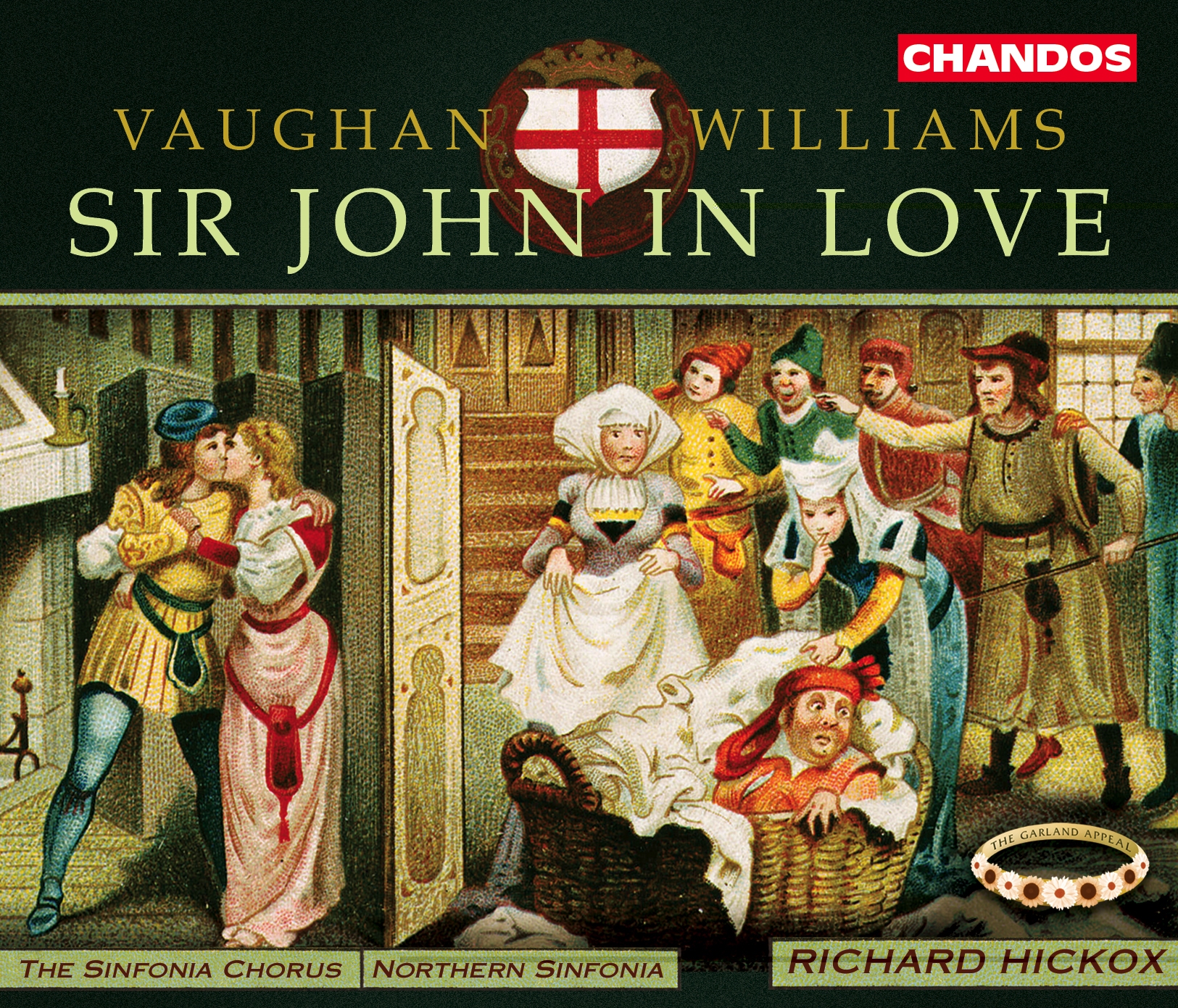
A member of the Darwin and Wedgewood families, Vaughan Williams had independent means, which meant he could afford to follow his artistic interests. He loved opera and theater and composed far more incidental music and ballets than people usually give him credit for. He wrote five operas: Hugh the Drover, The Poisoned Kiss, Sir John in Love, Riders to the Sea, and The Pilgrim’s Progress. None of them have held the stage. Until the advent of Britten’s Peter Grimes, no British opera did, and the native tradition was distinctly spotty. Vaughan Williams’s most distinguished predecessors were Sullivan (the operettas) and Holst (Savitri). VW began working on Poisoned Kiss, Sir John, and Riders at roughly the same time, but the three works couldn’t differ more. Poisoned Kiss, a comic operetta on the same idea as Hawthorne’s “Rappaccini’s Daughter.” Sir John is the most conventional of VW’s operas. The composer himself capably adapted Shakespeare’s Merry Wives of Windsor and added Elizabethan lyrics (and a French folk song) for arias from Shakespeare, Ben Johnson, Campion, and others. He also sprinkled in some English folk tunes (which occupy a grand total of 15 minutes of the score), some for dramatic point (like “John, come kiss me now” and “Greensleeves”), some just because that’s what he wanted at that moment. He wrote the opera with the knowledge that it would probably sink without a trace, but the tunes were just too good to lose. He recycled some of the numbers as the cantata In Windsor Forest and allowed an arrangement for strings, flute, and harp by R. Greaves, the Fantasia on “Greensleeves”, which became a VW hit.
Details
- Composer: Ralph Vaughan-Williams
- Title: Sir John in Love
- Cast:
Adrian Thompson tenor (solo parts) - Shallow
Stephan Loges baritone (ensemble parts) - Shallow
Stephen Varcoe bass - Sir Hugh Evans
Daniel Norman tenor - Slender
Henry Moss baritone - Peter Simple
Roderick Williams baritone - Page
Donald Maxwell baritone - Sir John Falstaff
John Bowen tenor - Bardolph
Richard Lloyd-Morgan bass - Nym
Brian Bannatyne-Scott baritone - Pistol
Susan Gritton soprano - Anne Page
Laura Claycomb soprano - Mrs Page
Sarah Connolly mezzo-soprano - Mrs Ford
Mark Padmore tenor- Fenton
Adrian Thompson tenor - Dr Caius
Mark Richardson bass - Rugby
Anne-Marie Owens mezzo-soprano - Mrs Quickly
Stephan Loges baritone - The Host of the 'Garter Inn'
Matthew Best bass - Ford
Sinfonia Chorus
Northern Sinfonia
Richard Hickox, conductor - Additional information:
Ralph Vaughan Williams (1872-1958)
Sir John in Love 136:39
An opera in four acts
The libretto based on Shakespeare's 'The Merry Wives of Windsor'
COMPACT DISC ONE
Act I
1 Orchestral introduction - 6:48
Shallow, Sir Hugh Evans: 'What hoa, what hoa!'
2 Anne Page: 'Ahem' 1:46
3 Anne Page: 'This is my father's choice' 8:03
4 Page: 'How now, what does Master Fenton here?' 1:02
5 Dr Caius: 'Vere is dat knave Rugby?' 6:52
6 Episode 2:22
7 Bardolph, Nym, Pistol: 'How now, mine Host of the Garter' 2:49
8 Sir John Falstaff: 'I spy entertainment in her . . .' 3:37
9 Pistol: 'Wilt thou revenge . . .?' 2:20
10 Ford: 'Love my wife? I will be patient' 3:33
Act II
11 Orchestral introduction - 6:25
Scene 1
Mrs Page: ' 'Thine own true knight' '
12 Mrs Qucikly: 'Sigh no more, ladies, sigh no more' 3:00
Scene 2
13 Sir John Falstaff: 'Bardolph! Bardolph, I say!' 5:28
14 Sir John Falstaff: 'Go thy ways, go thy ways, old Jack!' 5:10
15 Ford: 'Sir, my name is Brook' 5:31
16 Ford: 'Ha, is this a vision?' 3:12
68:05
COMPACT DISC TWO
Act III
Scene 1: Interlude
1 Orchestral introduction - 5:41
Fenton: 'Yet hear me speak'
2 Chorus of Young Women: 'Fair and fair and twice so fair' 2:40
3 Anne Page: 'But listen, good mine Host' 2:25
Scene 2
4 Orchestral introduction - 3:49
Sir Hugh Evans: ' 'When as we sat in Papylon' '
5 Peter Simple: 'Yonder he's coming' 2:29
6 Page: 'Come, Master Ford' 1:46
7 Orchestral introduction - 2:23
Scene 3
Mrs Ford: 'What, John! What, Robert!'
8 Mrs Ford: 'Alas, my love, you do me wrong' 2:48
9 Mrs Quickly: 'Mistress Ford!' 2:07
10 Ford, Chorus of Men: 'Ah!' 4:23
Act IV
11 Orchestral introduction - 3:35
Scene 1
Ford: 'Pardon me, wife'
12 Mrs Page: 'There is an old tale that goes Herne the hunter' 6:37
13 (Interlude) 2:03
Scene 2
14 Orchestral introduction - 1:58
15 Sir John Falstaff: 'The Windsor bell hath struck twelve' 2:47
16 Mrs Ford: 'Ah' - 3:29
Sir John Falstaff: 'Who comes here?'
17 Mrs Qucikly: 'But till 'tis one o'clock' 0:57
18 Dance of the Fairies 1:57
19 Sir Hugh Evans: 'But stay! I smell a man of middle earth' 2:09
20 Page: 'Nay, do not fly' 4:24
21 Mrs Page: 'My heart misgives me' 2:58
22 Sir John Falstaff: 'Stand not amazed' 5:04
68:34
Recorded in:
Jubilee Hall, Newcastle
7-10 December 2000
Producer(s)
Brian Couzens
Sound Engineer(s)
Ralph Couzens
Christopher Brooke (Assistant)
James Atkins (Assistant) - Buy:







Hi Laura - It’s been a number of years since we last saw each other which might have been the St Francois d’Assis
Hi Laura Hello from Singapore! Big fan of your technique videos and performances on Youtube. Been a singer for about
Hello Ms Claycomb, hope everything is well with you. i am Tata, live in Boston and study vocal. I found your v
Hi Laura, It has been great to find this. I have admired you since our days in NATS (I was in OK at OCU). I don't know i